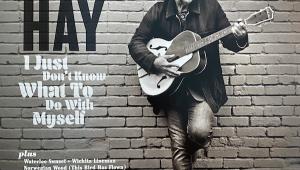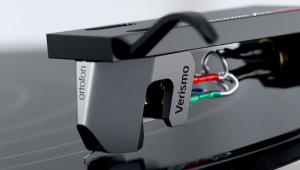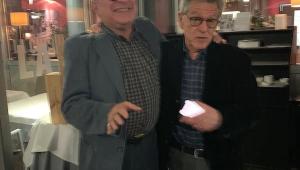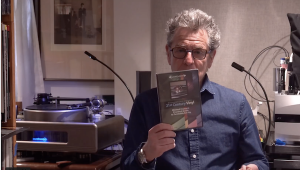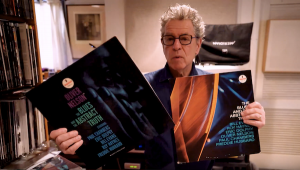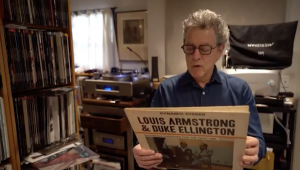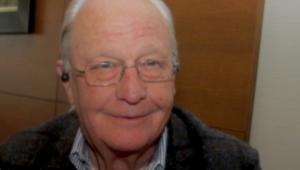Bob Irwin on The Byrds and the 'Planes Part 1
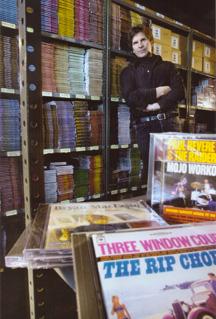
The Musicangle Interview: Sundazed’s Bob Irwin
When I first interviewed humble reissue genius Bob Irwin back in 1997, he told me that working as a freelance producer for Sony/Columbia/Legacy and other major labels, and having his own label, the much-respected Coxsackie, New York based Sundazed Records, has given him “the best of both worlds.”
Producing and overseeing well-received reissues by Johnny Cash, The Byrds, Simon & Garfunkel and many others for Sony, and issuing The Beau Brummels’ Autumn Years box set, Sit Down, It’s The Mojo Men, Skip Spence’s Oar The Byrds’ Preflyte Sessions and many others for Sundazed has given Bob an impressive resume and unrivaled credibility with both within the industry and among music fans around the world.
Sundazed, one of the most caring reissue labels, has also been a leading player in the amazing vinyl resurgence, reissuing superb-sounding, bargain-priced 180-gram vinyl LPs, including Van Dyke Parks’ Song Cycle, The Byrds Sanctuary series and The International Submarine Band’s Safe At Home.
I spoke with Bob recently—the day after Johnny Cash’s passing— about two just completed projects: the two-disc Sweetheart Of The Rodeo set and the BMG/Heritage reissues of the first four Jefferson Airplane albums. We were both saddened by the death of this American musical icon, and at the outset of the conversation, Bob commented on some of the work he’d personally done with Johnny…
Q: Johnny Cash’s passing…I hope he’s remembered as a man whose contribution to American music may be as important as Bob Dylan’s. You did work on several projects with him, right?
A: Yes, Ring Of Fire, Blood, Sweat & Tears, the upgraded version of the Johnny Cash box set, and also the really cool, expanded editions of San Quentin and Folsom Prison. On those, we went right back to the original multi-tracks and put the shows in their complete, original sequence. You know, it’s kind of a ‘double whammy,’ because I worked on his music, but also communicated with him directly. He was a wonderful guy. You know, you get to know an artist intimately through working on their music, and then when you factor in the human side of things…it sucks.
Part One
The Byrds:Sweetheart Of The Rodeo (2003 reissue)
Q: From your tape research, can you tell how much of the album was cut in L.A. vs. Nashville?
A: They started in Nashville, and it’s a bit peculiar because basically what happened was that nearly all of the original sessions were done in Nashville. Almost everything, with the exception of “Blue Canadian Rockies,” “One Hundred Years From Now,” and the Parsons vocal demos of “You Don’t Miss Your Water,” “You’re Still On My Mind” —those were all done in Hollywood.
The sessions started with “You Ain’t Goin’ Nowhere,” that was the first one and that was a total Nashville recording. “Hickory Wind” was a Nashville recording that they cut and then dragged the master tapes back to Hollywood and went crazy adding layers and layers of vocals on. You can hear the raw, earlier version on disc two of the new set. “Lazy Day” was completely in Nashville, as well as “I Am A Pilgrim,” “Pretty Boy Floyd,” “Reputation,” “Nothing Was Delivered” and “Pretty Polly,”
Q: Well, a couple of the songs that you just mentioned, “Reputation,” “Pretty Polly” and “Lazy Day” are the only songs from the sessions that McGuinn used his 12-string Rickenbacker on. It’s great having these on this set, but—and this is kind of a ‘what if’ situation— but it would have at least been interesting had the band elected to place a couple of these cuts with the electric 12-string on the original album. I’m speculating, but I think it would have made the album more…accessible to their fans at the time…
A: Yeah, I see what you’re saying. I’m sure that it was a conscious decision at the time not to use the 12-string. I think it’s also important to mention that those songs you mentioned were also cut without the 12-string as well, and they are included on this set. Frankly, I think that the 12-string was sweetening that was done in Hollywood after they got back.
Q: What were the differences in re-mastering the tapes from each locale, and what kind of condition were they in?
A: The tapes were in beautiful, beautiful shape. I don’t think anyone had touched them from 1968 until I got to them. As far as differences go, the Nashville tapes were primarily one-inch eight-track recordings brought to Hollywood for sweetening, and there was another eight-track synched up to that to do the sweetening and to make it an actual 16-track. All of the basic tracks in Hollywood for Gram’s demos were cut to 1/2-inch four-track.
Q: (Producer) Gary Usher had just come off of two very technically advanced album productions, The Byrds’ Notorious and The Millennium’s Begin with Curt Boettcher, where he was pushing recording technology to—and sometimes beyond—it's limits. For example, on those albums, he was synching up two 8-track machines, and working with a lot of other effects and tape processing. With that in mind, and from your work and tape research on Sweetheart, how far back did Gary go into simplicity in terms of the recording techniques?
A: I think that it’s important to say that Gary worked on Younger Than Yesterday, and I think that, not stylistically, but technique-wise, Sweetheart harkens back to that way of recording, that simplicity. I also think that this was also where Gary got to know the band members, so that by the time they got to Sweetheart, he was relaxed with the band. I think that the true talent in Gary Usher that I’ve observed was that in a lot of the projects of his that I’ve worked on, he was one of the young guys; one of the new school of producers at Columbia. Columbia was still staffed by a lot of the old-school producers that were harnessing talent and shaping, molding and directing bands. Gary, on the other hand, was known for letting the band do what they wanted to do, and he would sit back and do what the perfect producer should do, which is to work on how to improve things and offer suggestions. He knew he was working with pros; these were not ‘greenhorns.’
I think that Gary realized early on that this was going to be a somewhat radical departure from what had come before in The Byrds. I mean, he had the core of McGuinn and Hillman there, but he also had new faces in the crowd in Gram Parsons and Kevin Kelley, as well as all of the session guys—Lloyd Green, Jay Dee Maness, among others. It’s very clear from listening to the multi-tracks that Gary wasn’t the kind to guy to say, ‘Okay, let’s do it like this.’ ‘Hey guys, why don’t we put this in there?’ He wasn’t doing that. Gary was doing things like saying, ‘Hey guys, let’s do another one right away; that sounded good.’ That’s what I always thought was Gary’s strong suit was. When he got to cut loose on The Millennium and Sagittarius, that was him exercising his creative muscle, just flexing that and going for it and playing in the studio…but he was totally adaptable to the session at hand. Gosh, when you’re recording a country album with a new line-up of The Byrds in Nashville, there’s no way you’re going to apply a Millennium or Notorious…-like philosophy to the recording, and that was his true talent. That’s not just coming from me: McGuinn and Hillman will tell you the same thing; they loved working with Usher.
Q: Also, what McGuinn said to me was that on Younger Than Yesterday and Notorious…, Gary would also come out into the studio and play piano with the band sometimes. He was almost like a member of the band, in some ways.
A: Yup, that’s really the truth.
Q: On the super-rare International Submarine Band singles that open disc two…this is a brilliant inclusion in the set.
A: Thanks…those songs are so hard for people to find. I was able to get the masters on all of these. “Sum Up Broke” and “One Day Week” were all Columbia recordings, and those were in the vaults. The singles had such a unique and wonderful sound that I didn’t want to re-mix them. I used the original mono mixes. “Truck Drivin’ Man”, we got the master from E.M.I., which was originally on Ascot, which was a subsidiary of United Artists…
Q: Yeah, they released the U.S. Manfred Mann records in the 60’s…
A: Right. The mono master was right at E.M.I. for that. “Blue Eyes”, “Luxury Liner” and “Strong Boy” all came from the original L.H.I. 2-track stereo master, which was M.I.A. for a long time. Actually, when Sundazed released the vinyl edition about two years ago, that was cut from the absolute original two-track stereo master for the first time. The way we did that LP was that we found the tape and contacted the current owner of the tapes, Dale Davis, and told him, ‘I’ve got your original two-tracks here, and I’d love to do a vinyl and then send you your masters back…,’ and that’s just how that worked. So, naturally, we used those again for the cuts on Sweetheart….
Q: Yeah, that’s great, because it shows where some concepts met…
A: Yes, and it’s also the first time they have been legitimately compiled, and it gives you a little, ‘mini best-of’ International Sub Band. There’s certainly more of the story to tell, but I think we had to show where Gram came from, and it was a fortuitous opportunity to be able to put it on there. It works on every level: historically, musically and, frankly, as a selling point.
Q: How much input did McGuinn & Hillman have on this reissue?
A: I have wonderful relationships with both of them, and they were in the loop the whole way, and I’m happy to say that they pretty much trust my judgment when it comes to this. We do communicate often, as you can imagine, between the Byrds reissues on Sundazed and the entire catalogue on Sony. Keeping the artists involved and interested throughout the projects is a very, very vital piece of the puzzle to me. I don’t do well when there’s an artist that’s pissed off about something happening; that’s not the way I like to do a project. But those guys are great. I heard down at the Americana Conference in Nashville a few months ago, Chris just had nothing but wonderful words to say about the Byrds catalogue on Legacy, and that was really, really nice to hear.


